The Impact of National Culture on Multinational Corporation Strategy
VerifiedAdded on 2023/04/26
|9
|2622
|183
Essay
AI Summary
This essay critically examines the influence of national culture on the strategies employed by multinational corporations (MNCs). It begins by defining national culture and its significance in shaping consumer behavior and business practices, emphasizing the need for MNCs to align their strategies with the cultural nuances of their target markets. The essay then explores how national culture impacts various aspects of MNC strategy, including entry strategies, product/service adaptation, organizational culture, and promotional strategies. It highlights the importance of models like Hofstede's in understanding cultural dimensions and their implications for business operations. The analysis includes examples, such as McDonald's adaptation to Indian culture and the challenges faced by Walt Disney in France, to illustrate how cultural sensitivity can determine business success. The essay concludes by underscoring the crucial role of national culture in the formulation and implementation of successful MNC strategies, emphasizing that a deep understanding of cultural factors is essential for achieving business goals in diverse international markets.
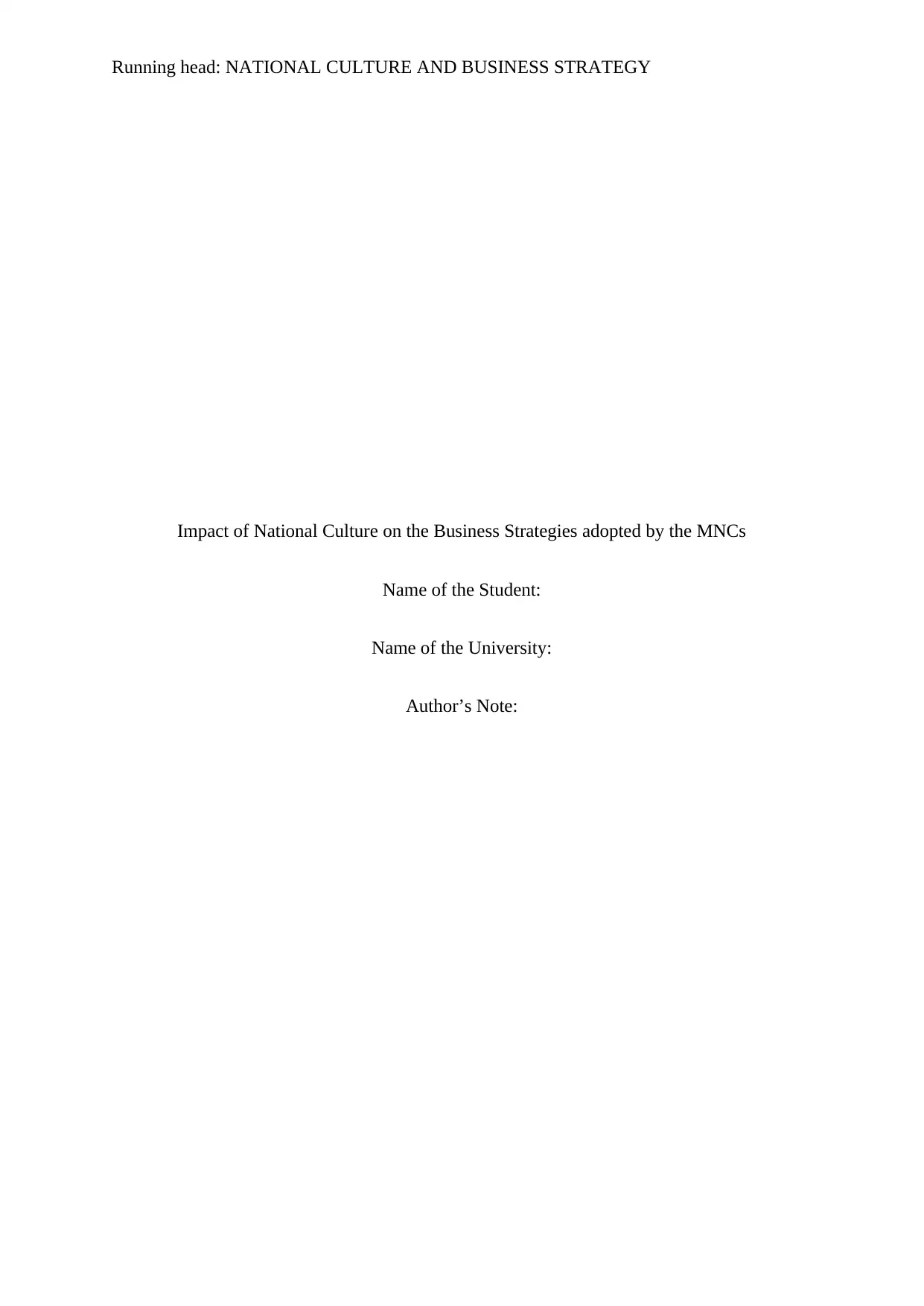
Running head: NATIONAL CULTURE AND BUSINESS STRATEGY
Impact of National Culture on the Business Strategies adopted by the MNCs
Name of the Student:
Name of the University:
Author’s Note:
Impact of National Culture on the Business Strategies adopted by the MNCs
Name of the Student:
Name of the University:
Author’s Note:
Paraphrase This Document
Need a fresh take? Get an instant paraphrase of this document with our AI Paraphraser
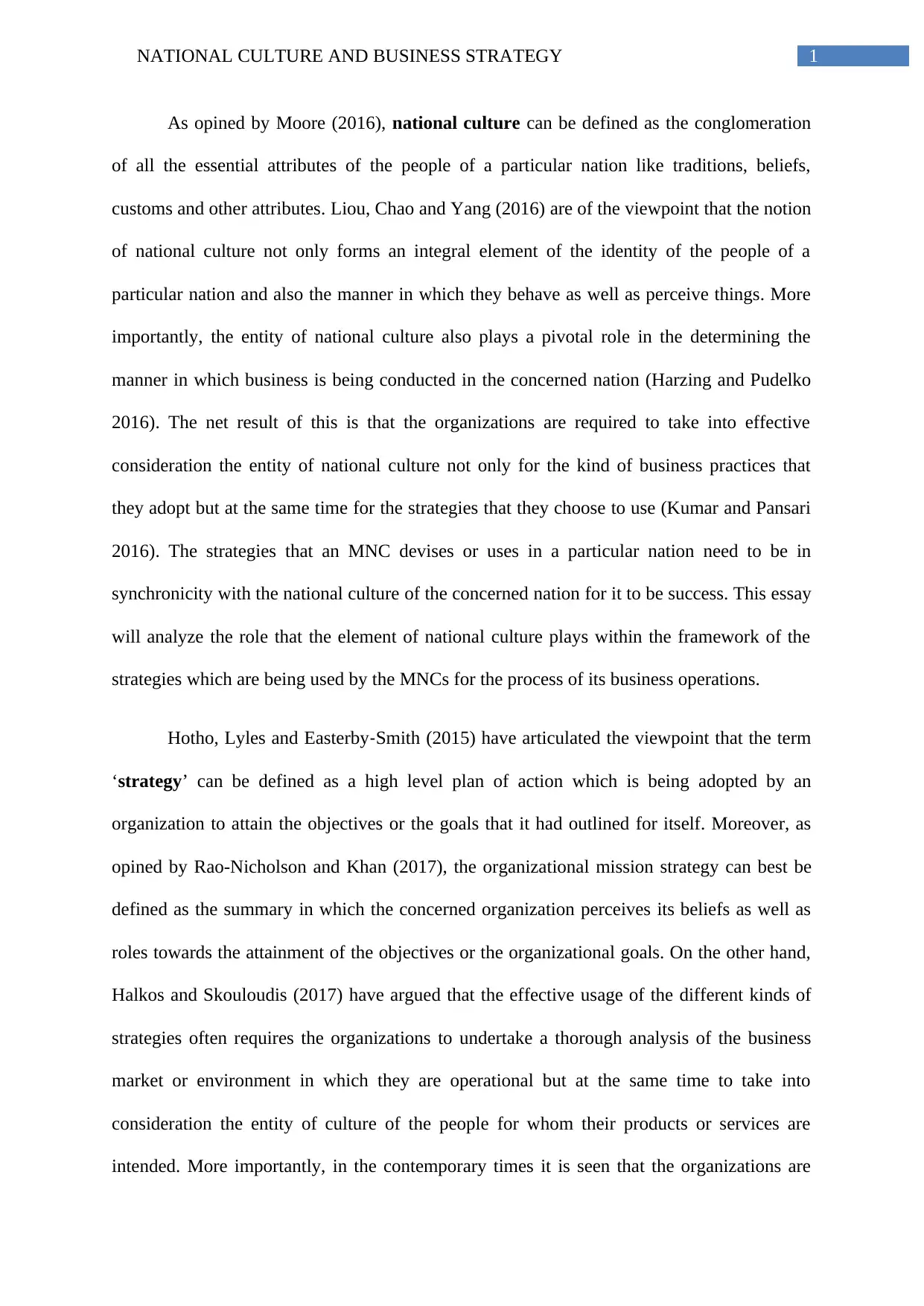
1NATIONAL CULTURE AND BUSINESS STRATEGY
As opined by Moore (2016), national culture can be defined as the conglomeration
of all the essential attributes of the people of a particular nation like traditions, beliefs,
customs and other attributes. Liou, Chao and Yang (2016) are of the viewpoint that the notion
of national culture not only forms an integral element of the identity of the people of a
particular nation and also the manner in which they behave as well as perceive things. More
importantly, the entity of national culture also plays a pivotal role in the determining the
manner in which business is being conducted in the concerned nation (Harzing and Pudelko
2016). The net result of this is that the organizations are required to take into effective
consideration the entity of national culture not only for the kind of business practices that
they adopt but at the same time for the strategies that they choose to use (Kumar and Pansari
2016). The strategies that an MNC devises or uses in a particular nation need to be in
synchronicity with the national culture of the concerned nation for it to be success. This essay
will analyze the role that the element of national culture plays within the framework of the
strategies which are being used by the MNCs for the process of its business operations.
Hotho, Lyles and Easterby‐Smith (2015) have articulated the viewpoint that the term
‘strategy’ can be defined as a high level plan of action which is being adopted by an
organization to attain the objectives or the goals that it had outlined for itself. Moreover, as
opined by Rao-Nicholson and Khan (2017), the organizational mission strategy can best be
defined as the summary in which the concerned organization perceives its beliefs as well as
roles towards the attainment of the objectives or the organizational goals. On the other hand,
Halkos and Skouloudis (2017) have argued that the effective usage of the different kinds of
strategies often requires the organizations to undertake a thorough analysis of the business
market or environment in which they are operational but at the same time to take into
consideration the entity of culture of the people for whom their products or services are
intended. More importantly, in the contemporary times it is seen that the organizations are
As opined by Moore (2016), national culture can be defined as the conglomeration
of all the essential attributes of the people of a particular nation like traditions, beliefs,
customs and other attributes. Liou, Chao and Yang (2016) are of the viewpoint that the notion
of national culture not only forms an integral element of the identity of the people of a
particular nation and also the manner in which they behave as well as perceive things. More
importantly, the entity of national culture also plays a pivotal role in the determining the
manner in which business is being conducted in the concerned nation (Harzing and Pudelko
2016). The net result of this is that the organizations are required to take into effective
consideration the entity of national culture not only for the kind of business practices that
they adopt but at the same time for the strategies that they choose to use (Kumar and Pansari
2016). The strategies that an MNC devises or uses in a particular nation need to be in
synchronicity with the national culture of the concerned nation for it to be success. This essay
will analyze the role that the element of national culture plays within the framework of the
strategies which are being used by the MNCs for the process of its business operations.
Hotho, Lyles and Easterby‐Smith (2015) have articulated the viewpoint that the term
‘strategy’ can be defined as a high level plan of action which is being adopted by an
organization to attain the objectives or the goals that it had outlined for itself. Moreover, as
opined by Rao-Nicholson and Khan (2017), the organizational mission strategy can best be
defined as the summary in which the concerned organization perceives its beliefs as well as
roles towards the attainment of the objectives or the organizational goals. On the other hand,
Halkos and Skouloudis (2017) have argued that the effective usage of the different kinds of
strategies often requires the organizations to undertake a thorough analysis of the business
market or environment in which they are operational but at the same time to take into
consideration the entity of culture of the people for whom their products or services are
intended. More importantly, in the contemporary times it is seen that the organizations are
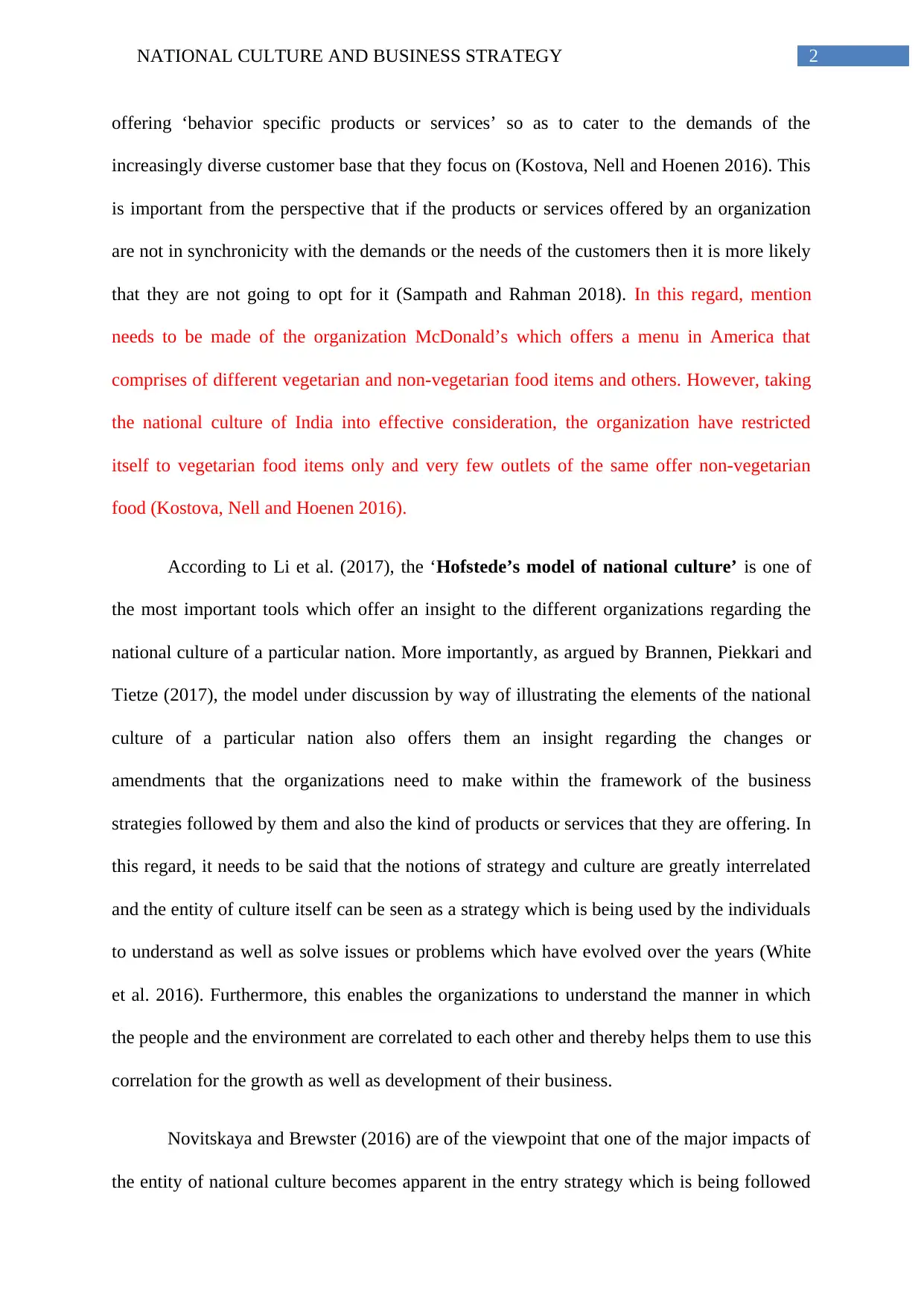
2NATIONAL CULTURE AND BUSINESS STRATEGY
offering ‘behavior specific products or services’ so as to cater to the demands of the
increasingly diverse customer base that they focus on (Kostova, Nell and Hoenen 2016). This
is important from the perspective that if the products or services offered by an organization
are not in synchronicity with the demands or the needs of the customers then it is more likely
that they are not going to opt for it (Sampath and Rahman 2018). In this regard, mention
needs to be made of the organization McDonald’s which offers a menu in America that
comprises of different vegetarian and non-vegetarian food items and others. However, taking
the national culture of India into effective consideration, the organization have restricted
itself to vegetarian food items only and very few outlets of the same offer non-vegetarian
food (Kostova, Nell and Hoenen 2016).
According to Li et al. (2017), the ‘Hofstede’s model of national culture’ is one of
the most important tools which offer an insight to the different organizations regarding the
national culture of a particular nation. More importantly, as argued by Brannen, Piekkari and
Tietze (2017), the model under discussion by way of illustrating the elements of the national
culture of a particular nation also offers them an insight regarding the changes or
amendments that the organizations need to make within the framework of the business
strategies followed by them and also the kind of products or services that they are offering. In
this regard, it needs to be said that the notions of strategy and culture are greatly interrelated
and the entity of culture itself can be seen as a strategy which is being used by the individuals
to understand as well as solve issues or problems which have evolved over the years (White
et al. 2016). Furthermore, this enables the organizations to understand the manner in which
the people and the environment are correlated to each other and thereby helps them to use this
correlation for the growth as well as development of their business.
Novitskaya and Brewster (2016) are of the viewpoint that one of the major impacts of
the entity of national culture becomes apparent in the entry strategy which is being followed
offering ‘behavior specific products or services’ so as to cater to the demands of the
increasingly diverse customer base that they focus on (Kostova, Nell and Hoenen 2016). This
is important from the perspective that if the products or services offered by an organization
are not in synchronicity with the demands or the needs of the customers then it is more likely
that they are not going to opt for it (Sampath and Rahman 2018). In this regard, mention
needs to be made of the organization McDonald’s which offers a menu in America that
comprises of different vegetarian and non-vegetarian food items and others. However, taking
the national culture of India into effective consideration, the organization have restricted
itself to vegetarian food items only and very few outlets of the same offer non-vegetarian
food (Kostova, Nell and Hoenen 2016).
According to Li et al. (2017), the ‘Hofstede’s model of national culture’ is one of
the most important tools which offer an insight to the different organizations regarding the
national culture of a particular nation. More importantly, as argued by Brannen, Piekkari and
Tietze (2017), the model under discussion by way of illustrating the elements of the national
culture of a particular nation also offers them an insight regarding the changes or
amendments that the organizations need to make within the framework of the business
strategies followed by them and also the kind of products or services that they are offering. In
this regard, it needs to be said that the notions of strategy and culture are greatly interrelated
and the entity of culture itself can be seen as a strategy which is being used by the individuals
to understand as well as solve issues or problems which have evolved over the years (White
et al. 2016). Furthermore, this enables the organizations to understand the manner in which
the people and the environment are correlated to each other and thereby helps them to use this
correlation for the growth as well as development of their business.
Novitskaya and Brewster (2016) are of the viewpoint that one of the major impacts of
the entity of national culture becomes apparent in the entry strategy which is being followed
⊘ This is a preview!⊘
Do you want full access?
Subscribe today to unlock all pages.

Trusted by 1+ million students worldwide
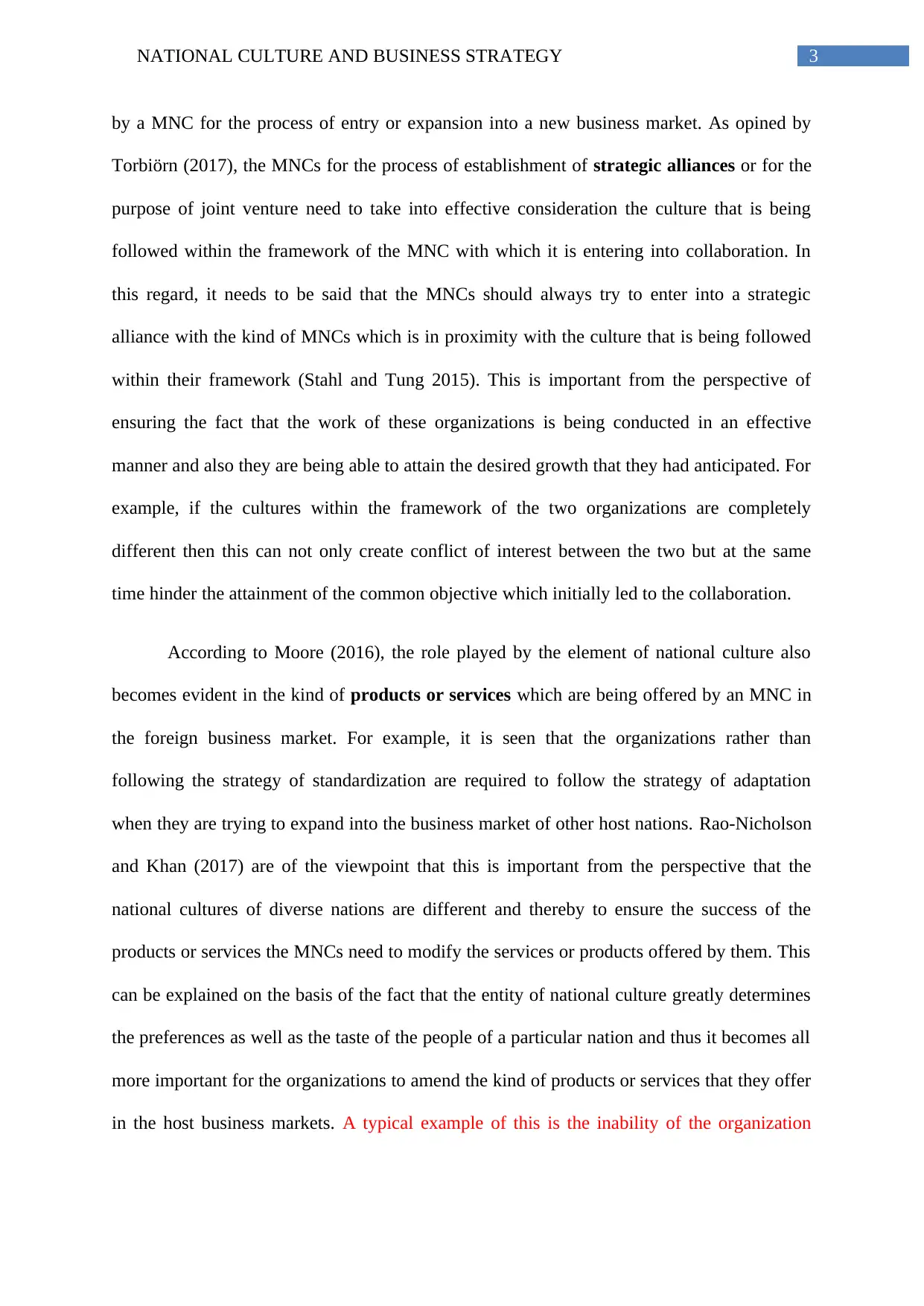
3NATIONAL CULTURE AND BUSINESS STRATEGY
by a MNC for the process of entry or expansion into a new business market. As opined by
Torbiörn (2017), the MNCs for the process of establishment of strategic alliances or for the
purpose of joint venture need to take into effective consideration the culture that is being
followed within the framework of the MNC with which it is entering into collaboration. In
this regard, it needs to be said that the MNCs should always try to enter into a strategic
alliance with the kind of MNCs which is in proximity with the culture that is being followed
within their framework (Stahl and Tung 2015). This is important from the perspective of
ensuring the fact that the work of these organizations is being conducted in an effective
manner and also they are being able to attain the desired growth that they had anticipated. For
example, if the cultures within the framework of the two organizations are completely
different then this can not only create conflict of interest between the two but at the same
time hinder the attainment of the common objective which initially led to the collaboration.
According to Moore (2016), the role played by the element of national culture also
becomes evident in the kind of products or services which are being offered by an MNC in
the foreign business market. For example, it is seen that the organizations rather than
following the strategy of standardization are required to follow the strategy of adaptation
when they are trying to expand into the business market of other host nations. Rao-Nicholson
and Khan (2017) are of the viewpoint that this is important from the perspective that the
national cultures of diverse nations are different and thereby to ensure the success of the
products or services the MNCs need to modify the services or products offered by them. This
can be explained on the basis of the fact that the entity of national culture greatly determines
the preferences as well as the taste of the people of a particular nation and thus it becomes all
more important for the organizations to amend the kind of products or services that they offer
in the host business markets. A typical example of this is the inability of the organization
by a MNC for the process of entry or expansion into a new business market. As opined by
Torbiörn (2017), the MNCs for the process of establishment of strategic alliances or for the
purpose of joint venture need to take into effective consideration the culture that is being
followed within the framework of the MNC with which it is entering into collaboration. In
this regard, it needs to be said that the MNCs should always try to enter into a strategic
alliance with the kind of MNCs which is in proximity with the culture that is being followed
within their framework (Stahl and Tung 2015). This is important from the perspective of
ensuring the fact that the work of these organizations is being conducted in an effective
manner and also they are being able to attain the desired growth that they had anticipated. For
example, if the cultures within the framework of the two organizations are completely
different then this can not only create conflict of interest between the two but at the same
time hinder the attainment of the common objective which initially led to the collaboration.
According to Moore (2016), the role played by the element of national culture also
becomes evident in the kind of products or services which are being offered by an MNC in
the foreign business market. For example, it is seen that the organizations rather than
following the strategy of standardization are required to follow the strategy of adaptation
when they are trying to expand into the business market of other host nations. Rao-Nicholson
and Khan (2017) are of the viewpoint that this is important from the perspective that the
national cultures of diverse nations are different and thereby to ensure the success of the
products or services the MNCs need to modify the services or products offered by them. This
can be explained on the basis of the fact that the entity of national culture greatly determines
the preferences as well as the taste of the people of a particular nation and thus it becomes all
more important for the organizations to amend the kind of products or services that they offer
in the host business markets. A typical example of this is the inability of the organization
Paraphrase This Document
Need a fresh take? Get an instant paraphrase of this document with our AI Paraphraser
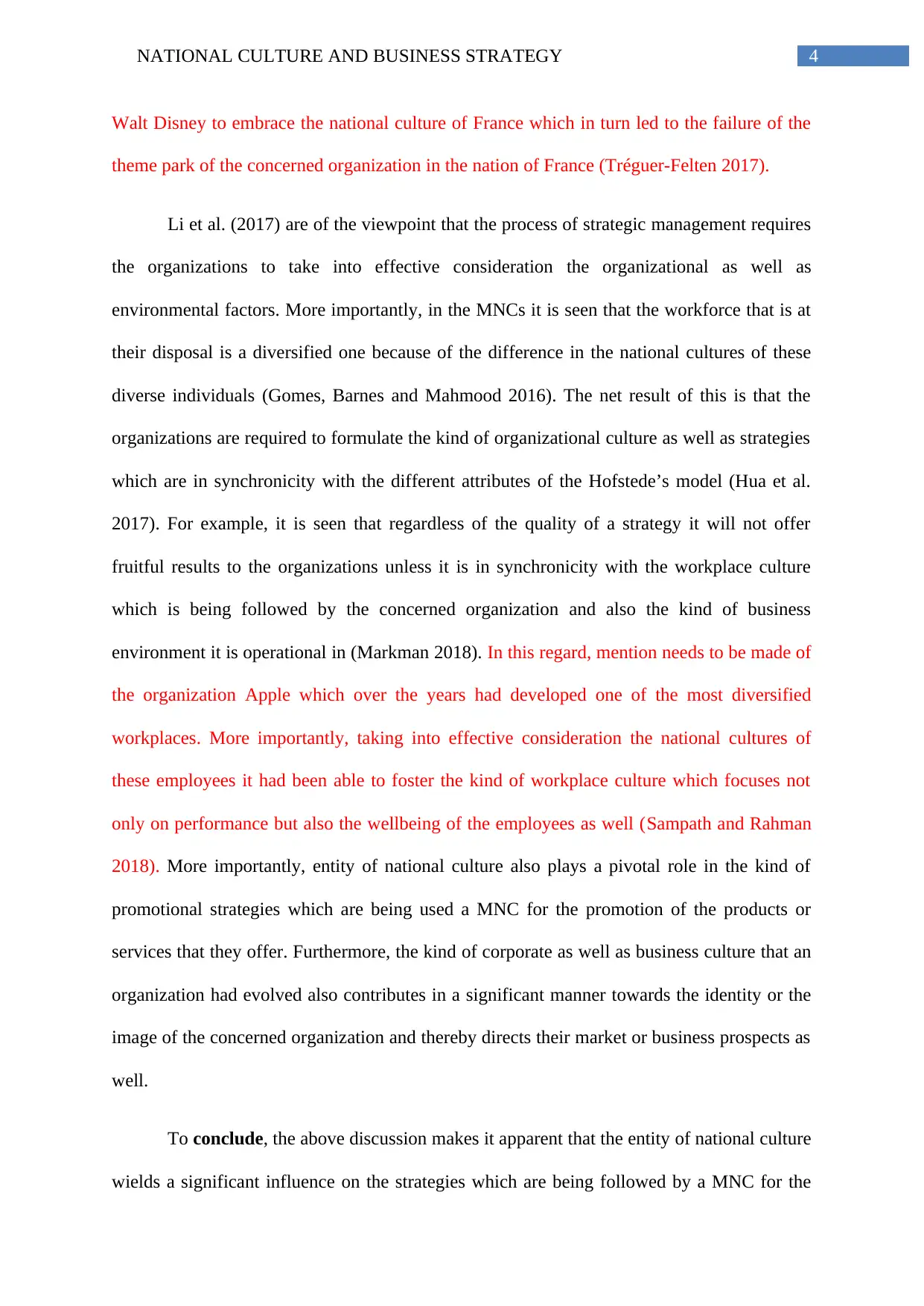
4NATIONAL CULTURE AND BUSINESS STRATEGY
Walt Disney to embrace the national culture of France which in turn led to the failure of the
theme park of the concerned organization in the nation of France (Tréguer-Felten 2017).
Li et al. (2017) are of the viewpoint that the process of strategic management requires
the organizations to take into effective consideration the organizational as well as
environmental factors. More importantly, in the MNCs it is seen that the workforce that is at
their disposal is a diversified one because of the difference in the national cultures of these
diverse individuals (Gomes, Barnes and Mahmood 2016). The net result of this is that the
organizations are required to formulate the kind of organizational culture as well as strategies
which are in synchronicity with the different attributes of the Hofstede’s model (Hua et al.
2017). For example, it is seen that regardless of the quality of a strategy it will not offer
fruitful results to the organizations unless it is in synchronicity with the workplace culture
which is being followed by the concerned organization and also the kind of business
environment it is operational in (Markman 2018). In this regard, mention needs to be made of
the organization Apple which over the years had developed one of the most diversified
workplaces. More importantly, taking into effective consideration the national cultures of
these employees it had been able to foster the kind of workplace culture which focuses not
only on performance but also the wellbeing of the employees as well (Sampath and Rahman
2018). More importantly, entity of national culture also plays a pivotal role in the kind of
promotional strategies which are being used a MNC for the promotion of the products or
services that they offer. Furthermore, the kind of corporate as well as business culture that an
organization had evolved also contributes in a significant manner towards the identity or the
image of the concerned organization and thereby directs their market or business prospects as
well.
To conclude, the above discussion makes it apparent that the entity of national culture
wields a significant influence on the strategies which are being followed by a MNC for the
Walt Disney to embrace the national culture of France which in turn led to the failure of the
theme park of the concerned organization in the nation of France (Tréguer-Felten 2017).
Li et al. (2017) are of the viewpoint that the process of strategic management requires
the organizations to take into effective consideration the organizational as well as
environmental factors. More importantly, in the MNCs it is seen that the workforce that is at
their disposal is a diversified one because of the difference in the national cultures of these
diverse individuals (Gomes, Barnes and Mahmood 2016). The net result of this is that the
organizations are required to formulate the kind of organizational culture as well as strategies
which are in synchronicity with the different attributes of the Hofstede’s model (Hua et al.
2017). For example, it is seen that regardless of the quality of a strategy it will not offer
fruitful results to the organizations unless it is in synchronicity with the workplace culture
which is being followed by the concerned organization and also the kind of business
environment it is operational in (Markman 2018). In this regard, mention needs to be made of
the organization Apple which over the years had developed one of the most diversified
workplaces. More importantly, taking into effective consideration the national cultures of
these employees it had been able to foster the kind of workplace culture which focuses not
only on performance but also the wellbeing of the employees as well (Sampath and Rahman
2018). More importantly, entity of national culture also plays a pivotal role in the kind of
promotional strategies which are being used a MNC for the promotion of the products or
services that they offer. Furthermore, the kind of corporate as well as business culture that an
organization had evolved also contributes in a significant manner towards the identity or the
image of the concerned organization and thereby directs their market or business prospects as
well.
To conclude, the above discussion makes it apparent that the entity of national culture
wields a significant influence on the strategies which are being followed by a MNC for the
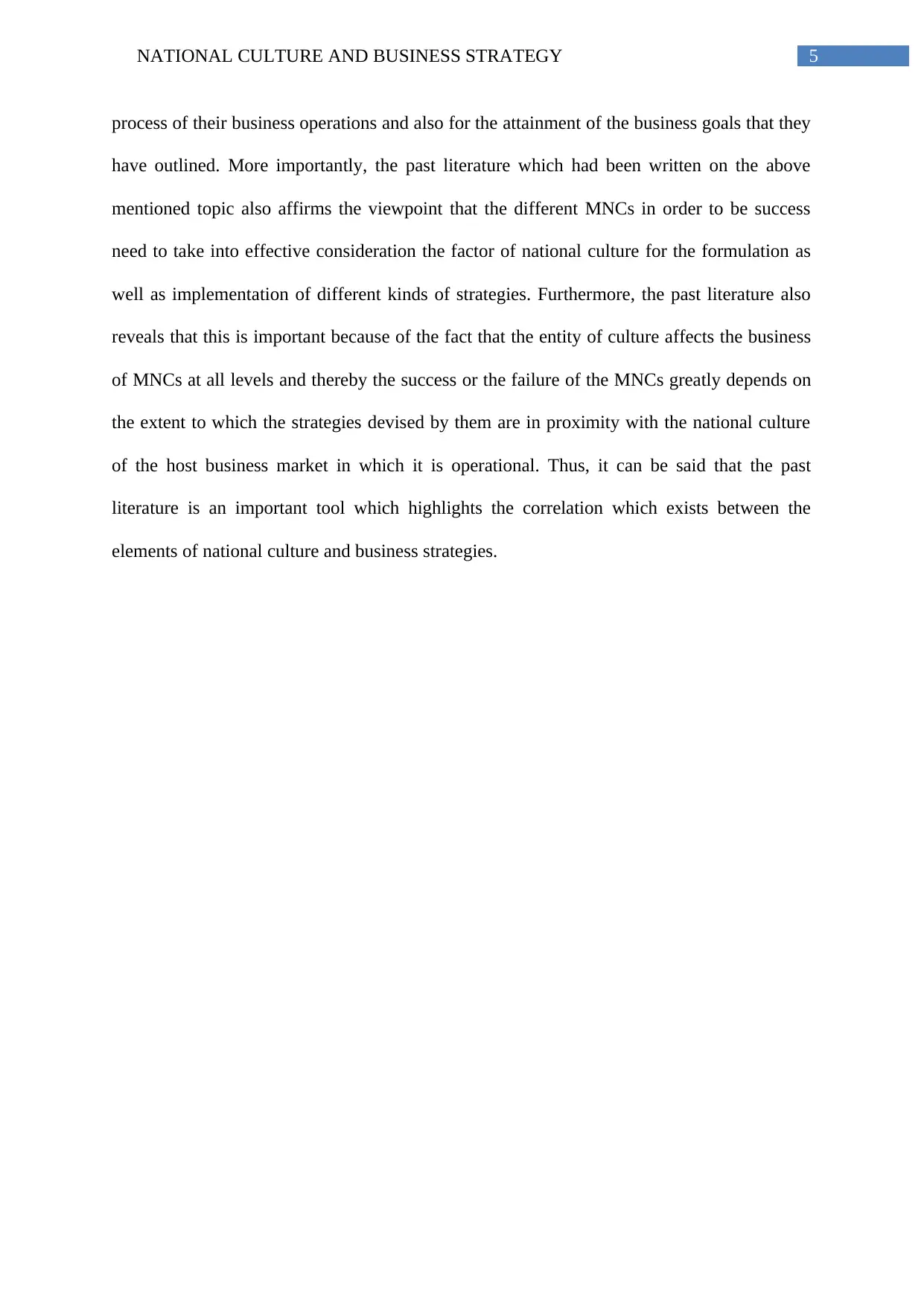
5NATIONAL CULTURE AND BUSINESS STRATEGY
process of their business operations and also for the attainment of the business goals that they
have outlined. More importantly, the past literature which had been written on the above
mentioned topic also affirms the viewpoint that the different MNCs in order to be success
need to take into effective consideration the factor of national culture for the formulation as
well as implementation of different kinds of strategies. Furthermore, the past literature also
reveals that this is important because of the fact that the entity of culture affects the business
of MNCs at all levels and thereby the success or the failure of the MNCs greatly depends on
the extent to which the strategies devised by them are in proximity with the national culture
of the host business market in which it is operational. Thus, it can be said that the past
literature is an important tool which highlights the correlation which exists between the
elements of national culture and business strategies.
process of their business operations and also for the attainment of the business goals that they
have outlined. More importantly, the past literature which had been written on the above
mentioned topic also affirms the viewpoint that the different MNCs in order to be success
need to take into effective consideration the factor of national culture for the formulation as
well as implementation of different kinds of strategies. Furthermore, the past literature also
reveals that this is important because of the fact that the entity of culture affects the business
of MNCs at all levels and thereby the success or the failure of the MNCs greatly depends on
the extent to which the strategies devised by them are in proximity with the national culture
of the host business market in which it is operational. Thus, it can be said that the past
literature is an important tool which highlights the correlation which exists between the
elements of national culture and business strategies.
⊘ This is a preview!⊘
Do you want full access?
Subscribe today to unlock all pages.

Trusted by 1+ million students worldwide
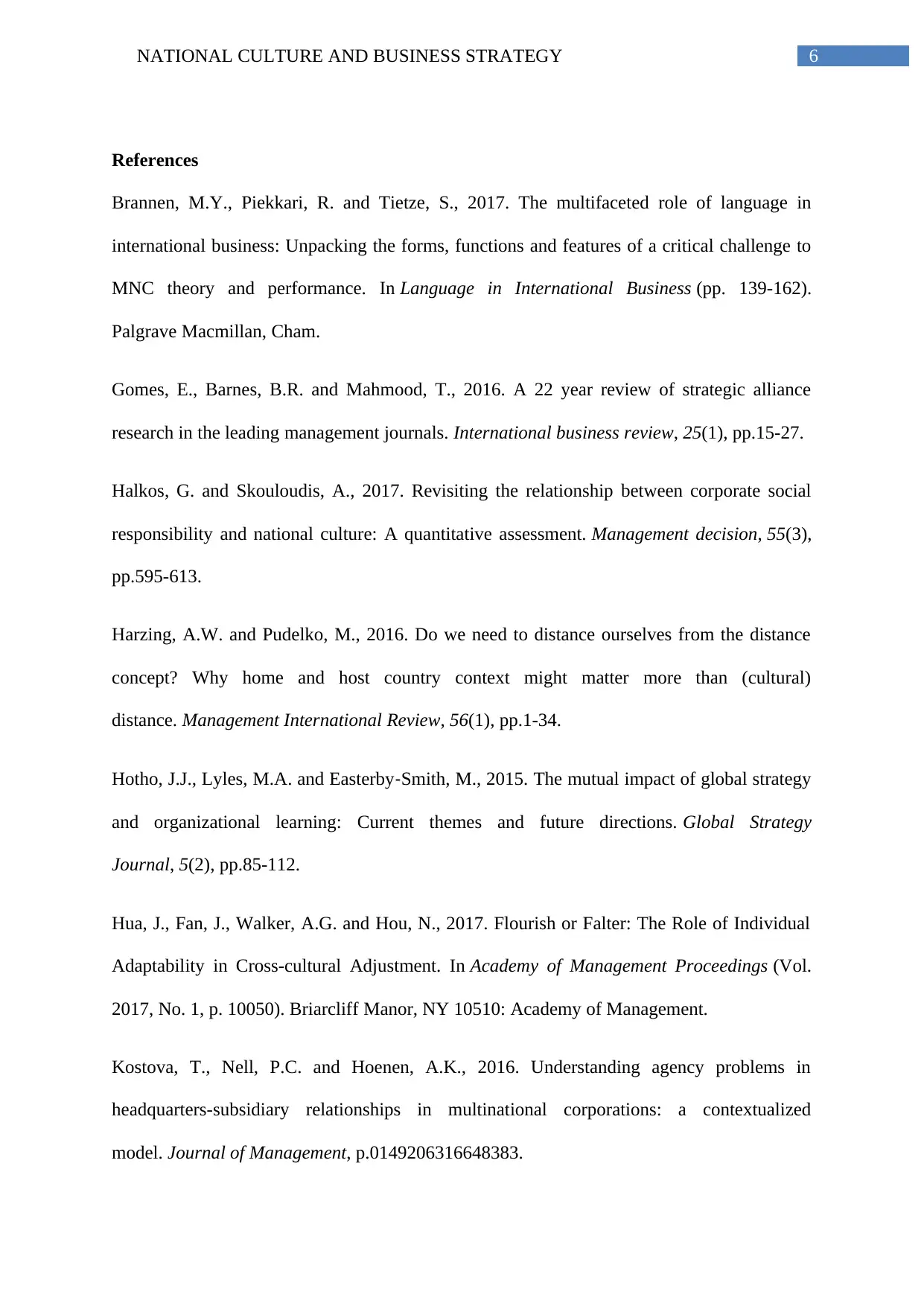
6NATIONAL CULTURE AND BUSINESS STRATEGY
References
Brannen, M.Y., Piekkari, R. and Tietze, S., 2017. The multifaceted role of language in
international business: Unpacking the forms, functions and features of a critical challenge to
MNC theory and performance. In Language in International Business (pp. 139-162).
Palgrave Macmillan, Cham.
Gomes, E., Barnes, B.R. and Mahmood, T., 2016. A 22 year review of strategic alliance
research in the leading management journals. International business review, 25(1), pp.15-27.
Halkos, G. and Skouloudis, A., 2017. Revisiting the relationship between corporate social
responsibility and national culture: A quantitative assessment. Management decision, 55(3),
pp.595-613.
Harzing, A.W. and Pudelko, M., 2016. Do we need to distance ourselves from the distance
concept? Why home and host country context might matter more than (cultural)
distance. Management International Review, 56(1), pp.1-34.
Hotho, J.J., Lyles, M.A. and Easterby‐Smith, M., 2015. The mutual impact of global strategy
and organizational learning: Current themes and future directions. Global Strategy
Journal, 5(2), pp.85-112.
Hua, J., Fan, J., Walker, A.G. and Hou, N., 2017. Flourish or Falter: The Role of Individual
Adaptability in Cross-cultural Adjustment. In Academy of Management Proceedings (Vol.
2017, No. 1, p. 10050). Briarcliff Manor, NY 10510: Academy of Management.
Kostova, T., Nell, P.C. and Hoenen, A.K., 2016. Understanding agency problems in
headquarters-subsidiary relationships in multinational corporations: a contextualized
model. Journal of Management, p.0149206316648383.
References
Brannen, M.Y., Piekkari, R. and Tietze, S., 2017. The multifaceted role of language in
international business: Unpacking the forms, functions and features of a critical challenge to
MNC theory and performance. In Language in International Business (pp. 139-162).
Palgrave Macmillan, Cham.
Gomes, E., Barnes, B.R. and Mahmood, T., 2016. A 22 year review of strategic alliance
research in the leading management journals. International business review, 25(1), pp.15-27.
Halkos, G. and Skouloudis, A., 2017. Revisiting the relationship between corporate social
responsibility and national culture: A quantitative assessment. Management decision, 55(3),
pp.595-613.
Harzing, A.W. and Pudelko, M., 2016. Do we need to distance ourselves from the distance
concept? Why home and host country context might matter more than (cultural)
distance. Management International Review, 56(1), pp.1-34.
Hotho, J.J., Lyles, M.A. and Easterby‐Smith, M., 2015. The mutual impact of global strategy
and organizational learning: Current themes and future directions. Global Strategy
Journal, 5(2), pp.85-112.
Hua, J., Fan, J., Walker, A.G. and Hou, N., 2017. Flourish or Falter: The Role of Individual
Adaptability in Cross-cultural Adjustment. In Academy of Management Proceedings (Vol.
2017, No. 1, p. 10050). Briarcliff Manor, NY 10510: Academy of Management.
Kostova, T., Nell, P.C. and Hoenen, A.K., 2016. Understanding agency problems in
headquarters-subsidiary relationships in multinational corporations: a contextualized
model. Journal of Management, p.0149206316648383.
Paraphrase This Document
Need a fresh take? Get an instant paraphrase of this document with our AI Paraphraser
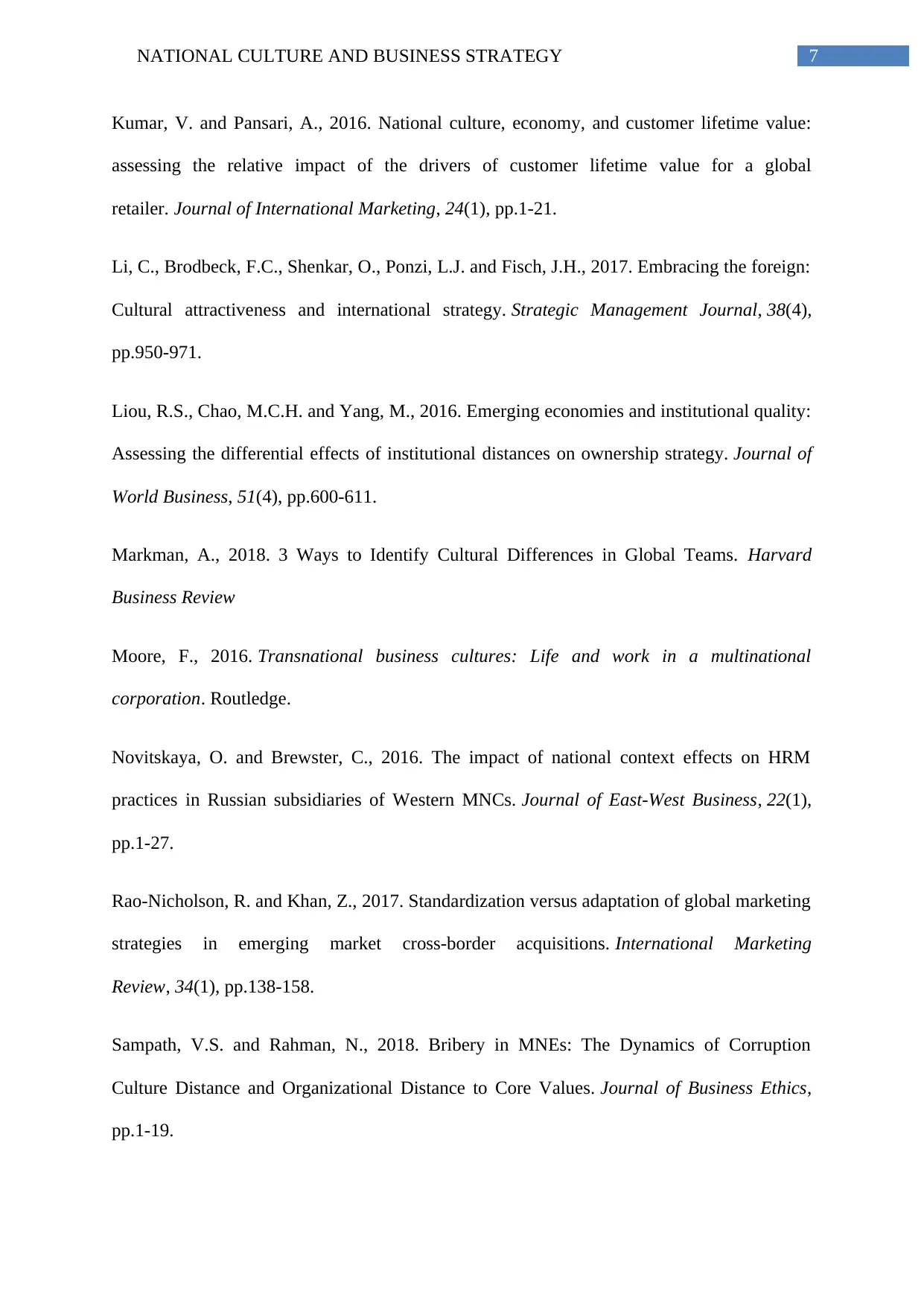
7NATIONAL CULTURE AND BUSINESS STRATEGY
Kumar, V. and Pansari, A., 2016. National culture, economy, and customer lifetime value:
assessing the relative impact of the drivers of customer lifetime value for a global
retailer. Journal of International Marketing, 24(1), pp.1-21.
Li, C., Brodbeck, F.C., Shenkar, O., Ponzi, L.J. and Fisch, J.H., 2017. Embracing the foreign:
Cultural attractiveness and international strategy. Strategic Management Journal, 38(4),
pp.950-971.
Liou, R.S., Chao, M.C.H. and Yang, M., 2016. Emerging economies and institutional quality:
Assessing the differential effects of institutional distances on ownership strategy. Journal of
World Business, 51(4), pp.600-611.
Markman, A., 2018. 3 Ways to Identify Cultural Differences in Global Teams. Harvard
Business Review
Moore, F., 2016. Transnational business cultures: Life and work in a multinational
corporation. Routledge.
Novitskaya, O. and Brewster, C., 2016. The impact of national context effects on HRM
practices in Russian subsidiaries of Western MNCs. Journal of East-West Business, 22(1),
pp.1-27.
Rao-Nicholson, R. and Khan, Z., 2017. Standardization versus adaptation of global marketing
strategies in emerging market cross-border acquisitions. International Marketing
Review, 34(1), pp.138-158.
Sampath, V.S. and Rahman, N., 2018. Bribery in MNEs: The Dynamics of Corruption
Culture Distance and Organizational Distance to Core Values. Journal of Business Ethics,
pp.1-19.
Kumar, V. and Pansari, A., 2016. National culture, economy, and customer lifetime value:
assessing the relative impact of the drivers of customer lifetime value for a global
retailer. Journal of International Marketing, 24(1), pp.1-21.
Li, C., Brodbeck, F.C., Shenkar, O., Ponzi, L.J. and Fisch, J.H., 2017. Embracing the foreign:
Cultural attractiveness and international strategy. Strategic Management Journal, 38(4),
pp.950-971.
Liou, R.S., Chao, M.C.H. and Yang, M., 2016. Emerging economies and institutional quality:
Assessing the differential effects of institutional distances on ownership strategy. Journal of
World Business, 51(4), pp.600-611.
Markman, A., 2018. 3 Ways to Identify Cultural Differences in Global Teams. Harvard
Business Review
Moore, F., 2016. Transnational business cultures: Life and work in a multinational
corporation. Routledge.
Novitskaya, O. and Brewster, C., 2016. The impact of national context effects on HRM
practices in Russian subsidiaries of Western MNCs. Journal of East-West Business, 22(1),
pp.1-27.
Rao-Nicholson, R. and Khan, Z., 2017. Standardization versus adaptation of global marketing
strategies in emerging market cross-border acquisitions. International Marketing
Review, 34(1), pp.138-158.
Sampath, V.S. and Rahman, N., 2018. Bribery in MNEs: The Dynamics of Corruption
Culture Distance and Organizational Distance to Core Values. Journal of Business Ethics,
pp.1-19.
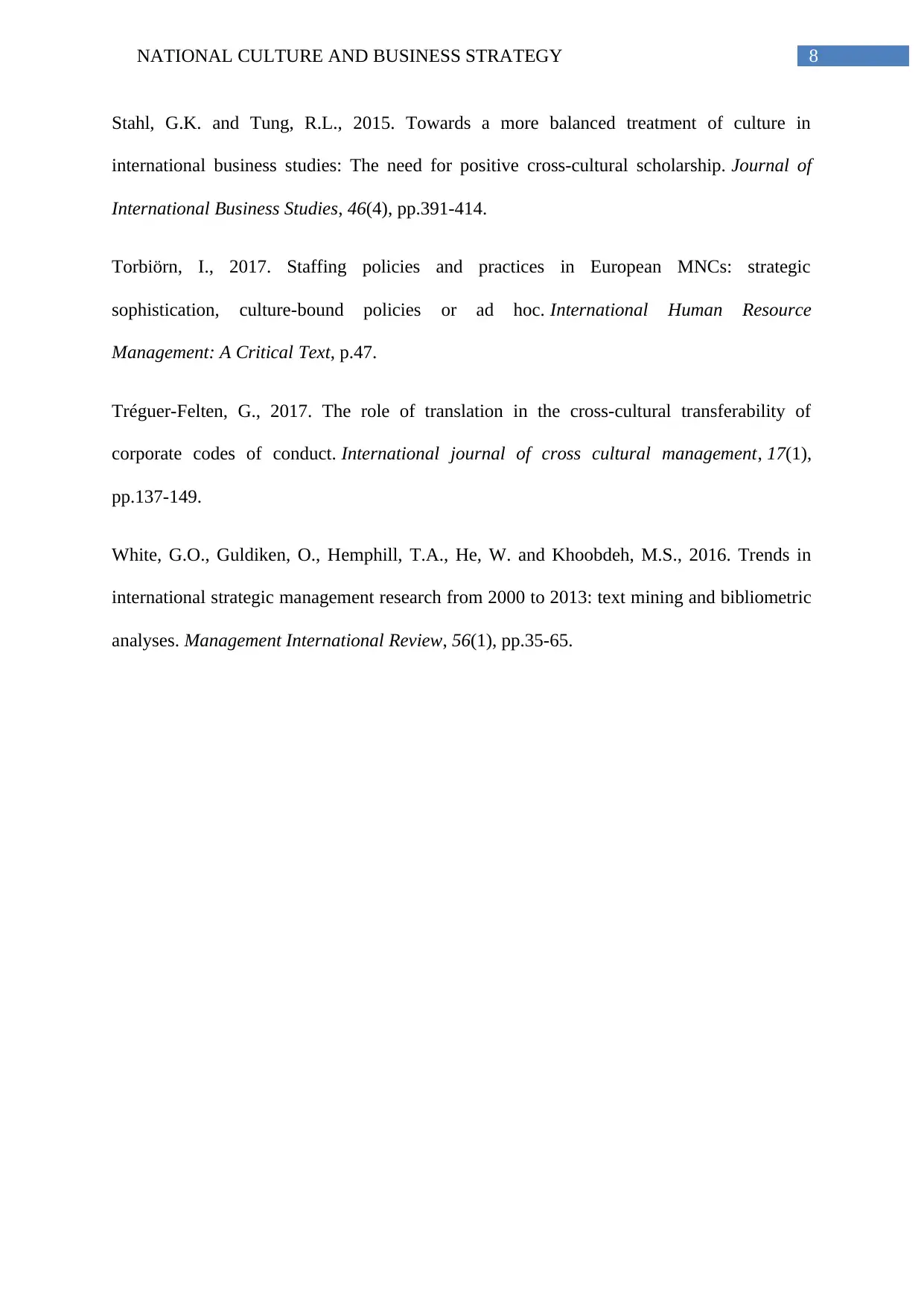
8NATIONAL CULTURE AND BUSINESS STRATEGY
Stahl, G.K. and Tung, R.L., 2015. Towards a more balanced treatment of culture in
international business studies: The need for positive cross-cultural scholarship. Journal of
International Business Studies, 46(4), pp.391-414.
Torbiörn, I., 2017. Staffing policies and practices in European MNCs: strategic
sophistication, culture-bound policies or ad hoc. International Human Resource
Management: A Critical Text, p.47.
Tréguer-Felten, G., 2017. The role of translation in the cross-cultural transferability of
corporate codes of conduct. International journal of cross cultural management, 17(1),
pp.137-149.
White, G.O., Guldiken, O., Hemphill, T.A., He, W. and Khoobdeh, M.S., 2016. Trends in
international strategic management research from 2000 to 2013: text mining and bibliometric
analyses. Management International Review, 56(1), pp.35-65.
Stahl, G.K. and Tung, R.L., 2015. Towards a more balanced treatment of culture in
international business studies: The need for positive cross-cultural scholarship. Journal of
International Business Studies, 46(4), pp.391-414.
Torbiörn, I., 2017. Staffing policies and practices in European MNCs: strategic
sophistication, culture-bound policies or ad hoc. International Human Resource
Management: A Critical Text, p.47.
Tréguer-Felten, G., 2017. The role of translation in the cross-cultural transferability of
corporate codes of conduct. International journal of cross cultural management, 17(1),
pp.137-149.
White, G.O., Guldiken, O., Hemphill, T.A., He, W. and Khoobdeh, M.S., 2016. Trends in
international strategic management research from 2000 to 2013: text mining and bibliometric
analyses. Management International Review, 56(1), pp.35-65.
⊘ This is a preview!⊘
Do you want full access?
Subscribe today to unlock all pages.

Trusted by 1+ million students worldwide
1 out of 9
Related Documents
Your All-in-One AI-Powered Toolkit for Academic Success.
+13062052269
info@desklib.com
Available 24*7 on WhatsApp / Email
![[object Object]](/_next/static/media/star-bottom.7253800d.svg)
Unlock your academic potential
Copyright © 2020–2026 A2Z Services. All Rights Reserved. Developed and managed by ZUCOL.





